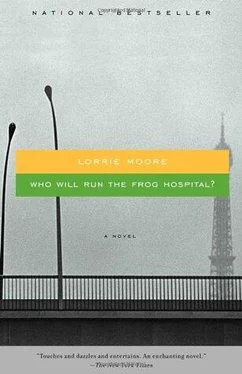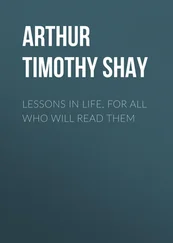Probably I was a little formal. “Well, thanks,” I said. Though I longed to do something now, as her foster sister, I had done nothing for LaRoue, ever. All I’d ever wanted was to be with Sils. An act of substitution, as maybe love always was. The world with its thinkers and refugees and difficult news had come to my doorstep, as best it could, for short visits — Mr. Sabeke from the Congo, say, or José Meyers from Argentina — they had all come to our house, people just out of prison (a fel low or a fe lon ? I’d asked a man named Ed Stedson, when I was ten, and he had laughed uproariously from his Hide-A-Bed), people came to us, orphaned and in need, like LaRoue, but all I’d wanted was my friend Sils, who would stay with me in my room and smile and smoke, keep the busy, roaring strange-tongued world at bay. In this, even if this were all, she could never become boring. If she lived where I lived then, at the moment, that was enough. If we spoke on the phone every night. If no one else came along, a visitor with snake oil and demands, to complicate our girlhood, it might stretch before us like a lovely beach. I’d wanted no other constructions. Only the simple, purgatorial life we had.
For LaRoue, I’d done nothing.
“I hope you don’t ever hold anything against me from when we were kids,” LaRoue said now. It shocked me.
“What things?” I asked.
“Oh, I don’t know. I look back, and it seems I was pretty mean to you and Claude.”
“You weren’t mean.”
“Well, thanks for saying that,” she said.
“No. I mean it.”
“You weren’t mean . I mean it,” she chanted, and started laughing nervously. “See that table over there? I had to vacuum under it this morning and guess what I found?”
“What?”
“Money,” she said, as if this were a secret I especially would appreciate.
“Good,” I said. “How much?”
“A five.”
“Great,” I said, though I wished for her sake it had been a twenty.
I ordered chicken salad, and she ordered soup and a soft muffin. We talked about my parents, about Claude doing so well with his computer business in Baltimore, about dogs and fillies and jockeys. We talked about Horsehearts and how the place was fifteen years ago. “You and Silsby Chaussée,” she said. “You guys were inseparable; it was the talk of the town.”
“It was?”
“Well, sort of. Now it would take a lot more than that to get the town talking.”
I smiled, tried to enjoy myself. “Yeah, like what?”
“Like a convention center,” she said, and we both laughed loudly.
When we finished eating, the check never came to the table. We waited, then got up, walked out of the dining room, and in the lobby she introduced me to the owner of the restaurant, a big, hale and hearty type who put his arm around LaRoue in an affectionate way. It seemed nice, the way he was with her, and at that moment, for a split second, she seemed happy.
“You were up here for your class reunion?” he asked me.
“That, and to see LaRoue,” I said. I lied.
“Those can be something, those reunions,” he said.
“You’re on your hundredth,” LaRoue said, flirting with him in this provincial, teasing way.
“Hundred and fiftieth!” he exclaimed. “Reunions,” he mused. “They just keep coming at you, and what can you do?”
“That’s true,” I said. “What can you do?”
“Well, it was a pleasure to meet you,” he replied, and shook my hand. He patted LaRoue on the back. “Lunch is on me.” When he left, I could see that she was worried about something.
“Are you OK?” I asked.
“Yeah. Sure.”
I had three hundred miles of driving ahead. “It was good to see you, LaRoue,” I said. I kissed her, threw my arms around her, taking in the big, ugly helplessness of her. Then I got in the car.
“You take care,” she said. “You take care of yourself.”
Driving alone along the Northway, feeling more haunted than I really had the courage to be, I cried in the car the way one does when leaving someone in a bitter and unbearable way. I don’t know why I should have picked that time to grieve, to summon everything before me — my own monstrousness, my two-bit affections, three-bit, four. It could have been sooner, it could have been later, it could have been one of the hot, awkward funerals (my grandmother’s, LaRoue’s, my father who one morning in Vero Beach clutched his fiery arm and fell dead off his chair mouthing to my mother, “Help. Heart. I love you”—how every death makes the world a lonelier place), it could have been some other time when the sun wasn’t so bright, and there was no news on the radio, and my arms were not laced in a bird’s nest on the steering wheel, my life going well, I believed, pretty well. It could have been any other time. But it was then: I cried for Sils and LaRoue, all that devotion and remorse, stars streaming light a million years after dying; I cried for the boyfriends I was no longer with, the people and places I no longer knew very well, for my parents and grandmother ailing and stuck in Florida, their tough, unchanging forms conjured only in memory: a jewel box kept in a medicine cabinet in the attic of a house on the moon; that’s where their unchanging forms were kept. I cried for everyone and for all the scrabbly, funny love one sent out into the world like some hit song that enters space and bounds off to another galaxy, a tune so pretty you think the words are true, you do! There was never any containing a song like that, keeping it. It went off and out, speeding out of earshot or imagining or any reach at all, like a rocket invented in sleep.
The next reunion, after that, five years later, Sils didn’t come, but sent flowers from Hawaii instead: To the class of ’74. Much love, Sils Chaussée . And after that I, too, sent flowers, and a note, and didn’t show up anymore.
YOU CAN wake from one dream only to find yourself plunged into yet another, like some endless rosary of the mind. When that happens, it is hard to glimpse what is not dream; the waking, undreamed world flies by you, in rushing flashes of light and air, in loud, quick, dangerous spaces like those between the cars of a train. There is nothing you can do. You walk in the sleep of yourself and wait. You wait for the train to pass.
Daniel believes he is working something out, wrestling with his heart, his work. He wants me to bear with him. He speaks in a coded way of all that is tempting and bewildering him, all issues of moral drunkenness. “It’s like I’m on a ride,” he says. “I go up, up, and up, and then wheeeee .”
“Except then the keys fall out of your pocket,” I say sternly. “And then you can’t get back into the house.”
He tries to look bemused. “I had a dream last night that I rounded a corner and someone lifted a gun and shot me, the bullet slamming straight through my sternum.” He pauses. “Do you think that’s bad luck?” He sighs, then begins to whisper. “I’m afraid of one day turning into my father. When he was my age, he left my mother for a woman twenty years younger.”
I say nothing. I melt a whiskey truffle on my tongue. In my vision there are lines running through everything; even the fabric of the drapes and upholstery seem to be raining, like the clothes in a portrait by van Gogh.
Daniel looks sad, draws his large man’s hand down across his face; his voice constricts with sorrow. “My mother, of course, took it with the great good humor with which it was intended.”
“She lost her mind,” I say.
“Yes,” he says. “She lost her mind.”
Eating brains — their spongy circuitry reabsorbed — we pretend is an ecological act. But perhaps it is more like monsters in a science fiction movie. Brains! Brains! Brains! As if we have run out of our own. So far in our marriage we’ve fought fear with ineptitude, indifference with indifference; the world blows up here and there, and our lives feel staked out in the embers, pitched and huddled in tents. We course through the hairpin turns of denials and shouts — it’s the end, it can’t be the end — we are in the loveliest city in the world: the expensive coffees, the red chemical sunset, the bateaux mouches flashing by each sooty church, lighting it up like a stage. In salons de thé the waiters set the crêpes aflame with Bic Flics pulled brusquely from their shirt pockets. The gendarmes hassle the African men in the métro; the poodles defecate with impunity on the walks. You can’t name your child anything not on a national list — and this is the most civilized city on earth! The city of spring and songs and other compositions of the heart. We feel ourselves moving so minusculely against some process, some momentum, that we become inadvertently a part. We feel too small to fight. Desperation, laziness, horror — they all resemble one another in their flickering movements within us, the same thrashing shorthand. Ma chérie, is this our stop? We feel enslaved — is that what it is? — in some turning: of milk to rot to dirt and winds and then to what — to sleep? to stars? Time for another constellation!
Читать дальше












